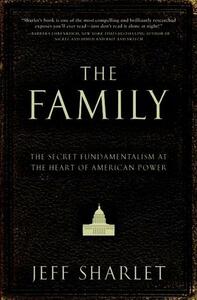You need to sign in or sign up before continuing.
Take a photo of a barcode or cover
challenging
dark
informative
reflective
medium-paced
Mixed feelings - seems like he didn’t have quite enough about The Family itself so the book digresses into a discussion about fundamentalist Christianity (things like Ted Haggard, Every Young Man’s Battle, Vision Forum) without being totally clear to me where the line is between or connecting those things. I believe there are connections but I’m not convinced they are exactly the same. I think there’s something here but I didn’t feel like this book quite got to the core of it. It seemed like he got overwhelmed by trying to explain fundamentalist Christianity and threw a bunch of things in the book without completely showing their connections to power.
While written in 2008 this book is very pertinent for today. I am from Kansas and several elected individuals were mentioned from my state and stated surrounding me. Shortly before I read this book President Trump referred to himself as “the chosen one” and many people were horrified by this statement. After reading this book that statement and his presidency makes much more sense.
After reading the first few chapters, I decided this was not something I cared enough about (or was interested enough in) to finish the remaining 350 pages. OK! I'll admit it - I gave up!
Simply a good book.
That starts with Sharlet’s conceit, if you will, of separating American fundamentalism into two strains — the elite and the populist.
With its plays on American and foreign leaders, The Family clearly is in the former. But, part of its genius has been, in more recent years, to stick its toes in the waters of the populist strain as it grew stronger, and got more of a sheen of respectability itself, starting approximately with Reagan’s election.
With the elite strain, Sharlet notes a few points very worth mentioning:
1. The Family, especially, isn’t that big on religious dogma and, especially at top eschelons, isn’t hugely big on political dogma, as long as a person doesn’t go too far left.
1A. It’s also, based on the type of developing world dictators it avidly embraces, quite selective on what “Christian ethics” are.
1B. Also related, based on how many of these leaders aren’t Christian, is about power, power politics and relations first, and somewhat that way on the domestic scene, too. I wouldn’t be totally surprised to hear that Imam Rauf of Park 51 in New York City turns up at a prayer breakfast hosted by The Family someday.
2. At the personal level, The Family is about power and relationships first, doctrine second, too. This can be summed up in two words — “submission” and “covenant.”
Just what all this, and much more, will mean for an America that shows little signs of incorporating much of the Western European welfare state (which would arguably undercut modern megachurch Christianity a lot) is all worth thinking about. Sharlet doesn’t have answers, but, by connecting the dots, he shows that there’s heavy lifting to be done … and, by referencing things like faith-based initiative programs at the end, shows that at least some Democrats (including our current president, my emphasis) have already given some things away.
That said, Sharlet still doesn’t tell us, in the end, too awful much about Family founder Abram Vereide, successor Doug Coe, or just all what the hell it wants, if it’s not big on doctrine but is on power and submission. Power, unless one is a psychopath, is a tool, a means, not an end in itself.
That starts with Sharlet’s conceit, if you will, of separating American fundamentalism into two strains — the elite and the populist.
With its plays on American and foreign leaders, The Family clearly is in the former. But, part of its genius has been, in more recent years, to stick its toes in the waters of the populist strain as it grew stronger, and got more of a sheen of respectability itself, starting approximately with Reagan’s election.
With the elite strain, Sharlet notes a few points very worth mentioning:
1. The Family, especially, isn’t that big on religious dogma and, especially at top eschelons, isn’t hugely big on political dogma, as long as a person doesn’t go too far left.
1A. It’s also, based on the type of developing world dictators it avidly embraces, quite selective on what “Christian ethics” are.
1B. Also related, based on how many of these leaders aren’t Christian, is about power, power politics and relations first, and somewhat that way on the domestic scene, too. I wouldn’t be totally surprised to hear that Imam Rauf of Park 51 in New York City turns up at a prayer breakfast hosted by The Family someday.
2. At the personal level, The Family is about power and relationships first, doctrine second, too. This can be summed up in two words — “submission” and “covenant.”
Just what all this, and much more, will mean for an America that shows little signs of incorporating much of the Western European welfare state (which would arguably undercut modern megachurch Christianity a lot) is all worth thinking about. Sharlet doesn’t have answers, but, by connecting the dots, he shows that there’s heavy lifting to be done … and, by referencing things like faith-based initiative programs at the end, shows that at least some Democrats (including our current president, my emphasis) have already given some things away.
That said, Sharlet still doesn’t tell us, in the end, too awful much about Family founder Abram Vereide, successor Doug Coe, or just all what the hell it wants, if it’s not big on doctrine but is on power and submission. Power, unless one is a psychopath, is a tool, a means, not an end in itself.
dark
informative
reflective
slow-paced
I watched the documentary on Netflix prior to reading this book, and I'm always fascinated by how the two mediums translate the same information in different ways. If you are picking up this book because of the documentary, the key things are that Sharlet's vivid prose (on display in the documentary) carries through throughout the book. When describing his personal experiences at Ivanwald, which holds less space in this book than I thought it would, it works well. In some cases after that, it adds flavor but in others I wish he would drop the pithy description for a better understanding of the actual facts. The middle also seemed to drag with a lot of information that, while adding further context to the depth and breadth of the Family and their form of religion, went on far too long. The last chapter before the conclusion is about religion and remaking history, which I was thrilled by, but then the conclusion came to an end abruptly. All in all, I'm glad I read this for context, but unless you want a deep dive into the details, the documentary (also updated with more recent events than this book is) hits most of the major points just fine.
To begin with let's stipulate that [a:Jeff Sharlet|251474|Jeff Sharlet|http://photo.goodreads.com/authors/1210026815p2/251474.jpg] has an agenda, but so do most writers of political analysis. Like it or not, the political is as much personal as vice versa & we've all got an ax to grind. Having said that this is a wonderfully well-written book & I enjoyed it immensely despite the fact that it triggered all my paranoia.
[b:The Family|6524798|The Family The Secret Fundamentalism at the Heart of American Power|Jeff Sharlet|http://ecx.images-amazon.com/images/I/51f20PR6UKL._SL75_.jpg|542198] is an examination of the The Fellowship (aka The Family) a somewhat secretive fundamentalist group that at its most overt is responsible for the National Prayer Breakfast & at its most covert is influencing political policy through its members on an international scale. Members of this group include people in power from both sides of the aisle. Their Christianity isn't like any that I've ever experienced. The essential notion is that those who are in power are in power because they are chosen by Jesus, &, therefore, all of their actions are justifiable in his name. The group has studied the organizing tactics of everyone from Marx to Hitler, breaking themselves into hierarchies that at their most fundamental are prayer cells.
On the surface this group might seem like an innocent way for people in power to network, but scrape that surface & things get scary. Some of their members believe the poor should be disenfranchised because they are poor & therefore unloved by Jesus & unworthy of the vote. The group has been supportive of genocidal dictators such as Suharto of Indonesia who came to their attention after his first half million killings.
The notion of a personal Jesus is not an unfamiliar one, but taken to such an extreme that all of one's actions are justified by him & this is out of hand. Sharlet also examines the history of American fundamentalism through this lens reminding the reader that the theocrats have always been with us. In the case of this group & all of its offshoots, however, I think the vision is less for a Taliban-style theocratic state & more for a concentration of power in the hands of the chosen (them).
This book could easily have been dry & hard going, but it reads like a thriller & it can easily give you nightmares. It will certainly make you re-examine how you see some of the people in our halls of power.
[b:The Family|6524798|The Family The Secret Fundamentalism at the Heart of American Power|Jeff Sharlet|http://ecx.images-amazon.com/images/I/51f20PR6UKL._SL75_.jpg|542198] is an examination of the The Fellowship (aka The Family) a somewhat secretive fundamentalist group that at its most overt is responsible for the National Prayer Breakfast & at its most covert is influencing political policy through its members on an international scale. Members of this group include people in power from both sides of the aisle. Their Christianity isn't like any that I've ever experienced. The essential notion is that those who are in power are in power because they are chosen by Jesus, &, therefore, all of their actions are justifiable in his name. The group has studied the organizing tactics of everyone from Marx to Hitler, breaking themselves into hierarchies that at their most fundamental are prayer cells.
On the surface this group might seem like an innocent way for people in power to network, but scrape that surface & things get scary. Some of their members believe the poor should be disenfranchised because they are poor & therefore unloved by Jesus & unworthy of the vote. The group has been supportive of genocidal dictators such as Suharto of Indonesia who came to their attention after his first half million killings.
The notion of a personal Jesus is not an unfamiliar one, but taken to such an extreme that all of one's actions are justified by him & this is out of hand. Sharlet also examines the history of American fundamentalism through this lens reminding the reader that the theocrats have always been with us. In the case of this group & all of its offshoots, however, I think the vision is less for a Taliban-style theocratic state & more for a concentration of power in the hands of the chosen (them).
This book could easily have been dry & hard going, but it reads like a thriller & it can easily give you nightmares. It will certainly make you re-examine how you see some of the people in our halls of power.
I first heard about this book during the various C-street scandals that hit some Republican senators over the last year or so. I got the book, mistakenly assuming it would be about the C-Street house and how it is used by various Congressman (I was wrong, but that book is coming out this Fall). Instead I found a book that covers the history of Christian Fundamentalism. Rather than just covering The Family (a particular group of fundamentalists), Sharlet goes back and starts with the Revival moments that swept America 200 years ago. I wasn't too familiar with the topic, so this was a great lesson in how this brand of Christianity started and thrived throughout our nation's history.
Sharlet covers The Family in almost overwhelming detail, from its creation, to its associations and its leaders. He also covers other important aspects of modern Christian fundamentalism, such as home-schooling (which puts an emphasis on viewing everything through a God filter).
All in all, I thought this was a great primer for people who don't know anything about modern Christian fundamentalism (especially as it pertains to American politics).
Sharlet covers The Family in almost overwhelming detail, from its creation, to its associations and its leaders. He also covers other important aspects of modern Christian fundamentalism, such as home-schooling (which puts an emphasis on viewing everything through a God filter).
All in all, I thought this was a great primer for people who don't know anything about modern Christian fundamentalism (especially as it pertains to American politics).
I finally finished this book, which I had started a few years ago, but then would have to read other books for various reasons, then it got lost for a while in a move, and then it had been so long since I had read it that it was difficult for me to pick it up again. I'm very glad that I did, though -- this is actually a fascinating look at the Right Wing radical Christian groups that have held power and outsized influence on our government for far longer than I had initially realized. This book was initially published in 2008, but it was even more interesting to read it now, in the age of Trump, to understand how and why we decided to elect a fascist authoritarian to run our country and how it is possible that throngs of people proclaim Trump to be a "great Christian."
I do recommend this book but it is chock full of details. It's one of those books where I felt like I should be taking notes.
I do recommend this book but it is chock full of details. It's one of those books where I felt like I should be taking notes.







